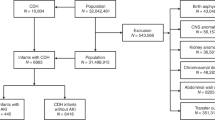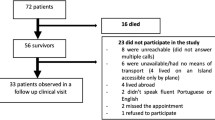Abstract
Objective
To examine incidence of acute kidney injury (AKI), antenatal and postnatal predictors, and impact of AKI on outcomes in infants with congenital diaphragmatic hernia (CDH).
Study design
Single center retrospective study of 90 CDH infants from 2009–2017. Baseline characteristics, CDH severity, possible AKI predictors, and clinical outcomes were compared between infants with and without AKI.
Result
In total, 38% of infants developed AKI, 44% stage 1, 29% stage 2, 27% stage 3. Lower antenatal lung volumes and liver herniation were associated with AKI. Extracorporeal life support (ECLS), diuretics, abdominal closure surgery, hypotension, and elevated plasma free hemoglobin were associated with AKI. Overall survival was 79%, 47% with AKI, and 35% with AKI on ECLS. AKI is associated with increased mechanical ventilation duration and length of stay.
Conclusion
AKI is common among CDH infants and associated with adverse outcomes. Standardized care bundles addressing AKI risk factors may reduce AKI incidence and severity.
This is a preview of subscription content, access via your institution
Access options
Subscribe to this journal
Receive 12 print issues and online access
$259.00 per year
only $21.58 per issue
Buy this article
- Purchase on SpringerLink
- Instant access to the full article PDF.
USD 39.95
Prices may be subject to local taxes which are calculated during checkout


Similar content being viewed by others
References
Benjamin JR, Bizzarro MJ, Cotton CM. Congenital diaphragmatic hernia: updates and outcomes. NeoReviews. 2011;12:e439–452.
Lagnham MR,Jr, Kays DW, Ledbetter DJ, Frentzen B, Sanford LL, Richards DS. Congenital diaphragmatic hernia. Epidemiology and outcome. Clin Perinatol. 1996;23:671–88.
Grover TR, Rintoul NE, Hedrick HL. Extracorporeal membrane oxygenation in infants with congenital diaphragmatic hernia. Semin Perinatol. 2018;42:96–103.
Gadepalli SK, Selewski DT, Drongowski RA, Mychaliska GB. Acute kidney injury in congenital diaphragmatic hernia requiring extracorporeal life support: an insidious problem. J Pediatr Surg. 2011;46:630–35.
Murthy K, Pallotto EK, Gien J, Brozanski BS, Porta NFM, Zaniletti I, et al. Predicting death or extended length of stay in infants with congenital diaphragmatic hernia. J Perinatol. 2016;36:654–59.
Benachi A, Cordier AG, Cannie M, Jani J. Advances in prenatal diagnosis of congenital diaphragmatic hernia. Semin Fetal Neonatal Med. 2014;19:331–37.
Jani JC, Nicolaides KH, Gratacós E, Vandecruys H, Deprest JA, FETO Task Group. Fetal lung-to-head ratio in the prediction of survival in severe left-sided diaphragmatic hernia treated by fetal endoscopic tracheal occlusion (FETO). Am J Obstet Gynecol. 2006;195:1646–50.
Barnewolt CE, Kunisaki SM, Fauza DO, Nemes LP, Estroff JA, Jennings RW. Percent predicted lung volumes as measured on fetal magnetic resonance imaging: a useful biometric parameter for risk stratification in congenital diaphragmatic hernia. J Pediatr Surg. 2007;42:193–97.
Lee TC, Lim FY, Keswani SG, Frischer JS, Haberman B, Kingma PS, et al. Late gestation fetal magnetic resonance imaging-derived total lung volume predicts postnatal survival and need for extracorporeal membrane oxygenation support in isolated congenital diaphragmatic hernia. J Pediatr Surg. 2011;46:1165–71.
Deprest JA, Flemmer AW, Gratacos E, Nicolaides K. Antenatal prediction of lung volume and in-utero treatment by fetal endoscopic tracheal occlusion in severe isolated congenital diaphragmatic hernia. Semin Fetal Neonatal Med. 2009;14:8–13.
Jani J, Nicolaides KH, Keller RL, Benachi A, Peralta CFA, Favre R, Antenatal-CDH Registry Group. et al. Observed to expected lung area to head circumference ratio in the prediction of survival in fetuses with isolated diaphragmatic hernia. Ultrasound Obstet Gynecol. 2007;30:67–71.
Hoste EA, Bagshaw SM, Bellomo R, Cely CM, Colman R, Cruz DN, et al. Epidemiology of acute kidney injury in critically ill patients: a multinational AKI-EPI study. Intensive Care Med. 2015;41:1411–23.
Kaddourah A, Basu RK, Bagshaw SM, Goldstein SL, AWARE Investigators. Epidemiology of acute kidney injury in critically ill children and young adults. N Engl J Med. 2017;376:11–20.
Jetton JG, Boohaker LJ, Sethi SK, Wazir S, Rohatgi S, Soranno DE, et al. Incidence and outcomes of neonatal acute kidney injury (AWAKEN): a multicenter, multinational, observational cohort study. Lancet Child Adolesc Health. 2017;1:184–94.
Ryan A, Gilhooley M, Patel N, Reynolds BC. Prevalence of acute kidney injury in neonates with congenital diaphragmatic hernia. Neonatology. 2020;117:88–94.
Kim-Campbell N, Gretchen C, Callaway C, Felmet K, Kochanek PM, Maul T et al. Cell-free plasma hemoglobin and male gender are risk factors for acute kidney injury in low risk children undergoing cardiopulmonary bypass. Crit Care Med. 2017. https://doi.org/10.1097/CCM.0000000000002703.
Mamikonian LS, Mamo LB, Smith PB, Koo J, Lodge AJ, Turi JL et al. Cardiopulmonary bypass is associated with hemolysis and acute kidney injury in neonates, infants, and children. Pediatr Crit Care Med. 2014. https://doi.org/10.1097/PCC.0000000000000047.
Vermeulen Windsant IC, Hanssenn SJ, Buurman WA, Jacobs MJ. Cardiovascular surgery and organ damage: time to reconsider the role of hemolysis. J Thorac Cardiovasc Surg. 2011;142:1–11.
Zappitelli M, Ambalavanan N, Askenazi DJ, Moxey-Mims MM, Kimmel PL, Star RA, et al. Developing a neonatal acute kidney injury research definition: a report from the NIDDK neonatal AKI workshop. Pediatr Res. 2017;82:569–73.
Harer MW, Charlton JR, Tipple TE, Reidy KJ. Preterm birth and neonatal acute kidney injury: implications on adolescent and adult outcomes. J Perinatol. 2020;40:1286–95.
Liu KD, Thompson BT, Ancukiewicz M, Steingrub JS, Douglas IS, Matthay MA, et al. National Institutes of Health National Heart, Lung, and Blood Institute Acute Respiratory Distress Syndrome Network: Acute kidney injury in patients with acute lung injury: impact of fluid accumulation on classification of acute kidney injury and associated outcomes. Crit Care Med. 2011;39:2665–71.
Askenazi DJ, Koralkar R, Levitan EB, Goldstein SL, Devarajan P, Khandrika S, et al. Baseline values of candidate urine acute kidney injury biomarkers vary by gestational age in premature infants. Pediatr Res. 2011;70:302–6.
Fleming GM, Sahay R, Zappitelli M, King E, Askenazi DJ, Bridges BC, et al. The incidence of acute kidney injury and its effect on neonatal and pediatric extracorporeal membrane oxygenation outcomes: a multicenter report from the kidney intervention during extracorporeal membrane oxygenation study group. Pediatr Crit Care Med. 2016;17:1157–69.
Zwiers AJM, de Wildt SN, Hop WCJ, Dorresteijn EM, Gischler SJ, Tibboel D, et al. Acute kidney injury is a frequent complication in critically ill neonates receiving extracorporeal membrane oxygenation: a 14-year cohort study. Crit Care. 2013;17:R151.
Askenazi DJ, Ambalavanan N, Hamilton K, Cutter G, Laney D, Kaslow R et al. Acute kidney injury and renal replacement therapy independently predict mortality in neonatal and pediatric noncardiac patients on extracorporeal membrane oxygenation. Pediatr Crit Care Med. 2011. https://doi.org/10.1097/PCC.0b013e3181d8e348.
Charlton JR, Boohaker L, Askenazi D, Brophy PD, Fuloria M, Gien J, et al. Late onset neonatal acute kidney injury: results from the AWAKEN Study. Pediatr Res. 2019;85:339–48.
Charlton JR, Boohaker L, Askenazi D, Brophy PD, D’Angio C, Fuloria M, et al. Incidence and risk factors of early onset neonatal AKI. Clin J Am Soc Nephrol. 2019;14:184–95.
Morozov D, Morozova O, Pervouchine D, Severgina L, Tsyplakov A, Zakharova N, et al. Hypoxic renal injury in newborns with abdominal compartment syndrome (clinical and experimental study). Pediatr Res. 2018;83:520–26.
De Waele JJ, De Laet I, Kirkpatrick AW, Hoste E. Intra-abdominal hypertension and abdominal compartment syndrome. Am J Kidney Dis. 2011;57:159–69.
Laje P, Hedrick HL, Flake AW, Adzick NS, Peranteau WH. Delayed abdominal closure after congenital diaphragmatic hernia repair. J Pediatr Surg. 2016;51:240–43.
Sharma A, Mucino MJ, Ronco C. Renal functional reserve and renal recovery after acute kidney injury. Nephron Clin Pract. 2014;127:94–100.
Chawla LS, Ronco C. Renal stress testing in the assessment of kidney disease. KI Rep. 2016;1:57–63.
Acknowledgements
We acknowledge John Kinsella, MD and Ken Liechty, MD for their knowledge, expertise, and contribution to the care of these complex patients as part of the CDH team at Children’s Hospital Colorado.
Author information
Authors and Affiliations
Contributions
KMG, DES, MJK, and JG conceptualized and designed the study. BML, MJK, and JG acquired the data, and BML, JTB, and JG analyzed the data. BML, JTB, KMG, and JG interpreted the data. BML, JTB, and JG drafted the paper. All authors revised the paper. All authors approved the final version of the manuscript and agreed to be accountable for all aspects of the work.
Corresponding author
Ethics declarations
Conflict of interest
The authors declare no competing interests.
Additional information
Publisher’s note Springer Nature remains neutral with regard to jurisdictional claims in published maps and institutional affiliations.
Rights and permissions
About this article
Cite this article
Liberio, B.M., Brinton, J.T., Gist, K.M. et al. Risk factors for acute kidney injury in neonates with congenital diaphragmatic hernia. J Perinatol 41, 1901–1909 (2021). https://doi.org/10.1038/s41372-021-01119-1
Received:
Revised:
Accepted:
Published:
Version of record:
Issue date:
DOI: https://doi.org/10.1038/s41372-021-01119-1
This article is cited by
-
Comparison of creatinine- and cystatin C–based definitions of acute kidney injury in neonates with congenital diaphragmatic hernia
Pediatric Nephrology (2026)
-
Incidence of and risk factors for acute kidney injury in neonates with congenital diaphragmatic hernia
European Journal of Pediatrics (2025)
-
Expanded discussion of kidney health monitoring for critically ill term and late preterm infants after acute kidney injury: a report from the Neonatal Kidney Health Consensus Workshop
Pediatric Nephrology (2025)
-
Arterial hypertension in infants with congenital diaphragmatic hernia following surgical repair
European Journal of Pediatrics (2024)
-
Acute kidney injury, fluid balance, and continuous renal replacement therapy in children and neonates treated with extracorporeal membrane oxygenation
Intensive Care Medicine – Paediatric and Neonatal (2024)



